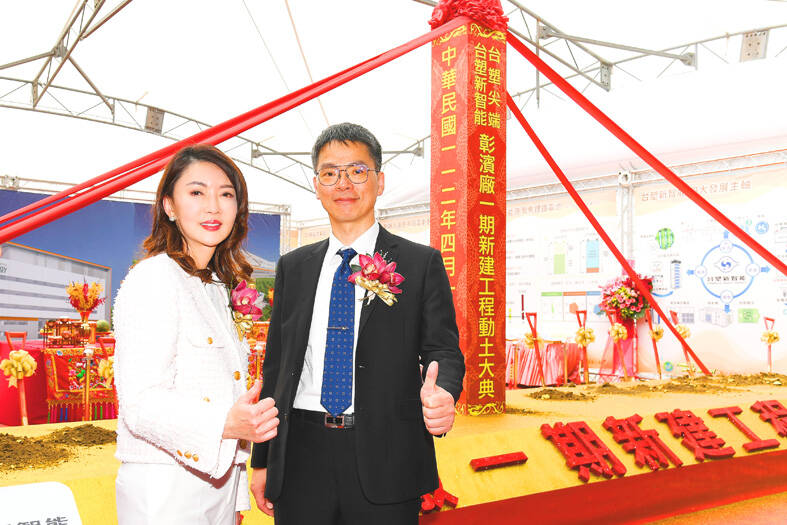Formosa Smart Energy Tech Corp (台塑新智能科技) has broken ground for a lithium iron phosphate battery cell plant in Changhua County and aims to start production at the site in the second half of next year.
Speaking at the groundbreaking ceremony on Wednesday last week, Formosa Smart Energy chairwoman Sandy Wang (王瑞瑜) said the first phase of the plant would have a production capacity of 2.1 gigawatt-hours (GWh) in battery cells and modules.
Formosa Smart Energy, part of the Formosa Plastics Group (FPG, 台塑集團), is investing NT$16 billion (US$525.19 million) to build the factory at the Changhua Coastal Industrial Park (彰濱工業區).

Photo: Chang Hui-wen, Taipei Times
Once it completes the second phase of the project, Formosa Smart Energy said the total production capacity of the combined site would reach 5GWh.
Wang said that FPG established Formosa Smart Energy in July last year to target the areas of energy conservation, energy storage, new energy development, and energy recycling and reuse.
The battery cell plant is expected to serve as a bridge connecting upstream, middle-stream and downstream segments of the local battery industry, she said.
As for energy storage, Formosa Smart Energy has inaugurated a facility in Tainan’s Yongkang District (永康) and plans to complete the construction of another plant in Changhua County by the end of this year, Wang said.
In addition, the company is also planning to build storage facilities in Yunlin, Nantou and Chiayi counties, she said.

BYPASSING CHINA TARIFFS: In the first five months of this year, Foxconn sent US$4.4bn of iPhones to the US from India, compared with US$3.7bn in the whole of last year Nearly all the iPhones exported by Foxconn Technology Group (富士康科技集團) from India went to the US between March and last month, customs data showed, far above last year’s average of 50 percent and a clear sign of Apple Inc’s efforts to bypass high US tariffs imposed on China. The numbers, being reported by Reuters for the first time, show that Apple has realigned its India exports to almost exclusively serve the US market, when previously the devices were more widely distributed to nations including the Netherlands and the Czech Republic. During March to last month, Foxconn, known as Hon Hai Precision Industry

Taiwan Semiconductor Manufacturing Co (TSMC, 台積電) and the University of Tokyo (UTokyo) yesterday announced the launch of the TSMC-UTokyo Lab to promote advanced semiconductor research, education and talent development. The lab is TSMC’s first laboratory collaboration with a university outside Taiwan, the company said in a statement. The lab would leverage “the extensive knowledge, experience, and creativity” of both institutions, the company said. It is located in the Asano Section of UTokyo’s Hongo, Tokyo, campus and would be managed by UTokyo faculty, guided by directors from UTokyo and TSMC, the company said. TSMC began working with UTokyo in 2019, resulting in 21 research projects,

Ashton Hall’s morning routine involves dunking his head in iced Saratoga Spring Water. For the company that sells the bottled water — Hall’s brand of choice for drinking, brushing his teeth and submerging himself — that is fantastic news. “We’re so thankful to this incredible fitness influencer called Ashton Hall,” Saratoga owner Primo Brands Corp’s CEO Robbert Rietbroek said on an earnings call after Hall’s morning routine video went viral. “He really helped put our brand on the map.” Primo Brands, which was not affiliated with Hall when he made his video, is among the increasing number of companies benefiting from influencer

Quanta Computer Inc (廣達) chairman Barry Lam (林百里) yesterday expressed a downbeat view about the prospects of humanoid robots, given high manufacturing costs and a lack of target customers. Despite rising demand and high expectations for humanoid robots, high research-and-development costs and uncertain profitability remain major concerns, Lam told reporters following the company’s annual shareholders’ meeting in Taoyuan. “Since it seems a bit unworthy to use such high-cost robots to do household chores, I believe robots designed for specific purposes would be more valuable and present a better business opportunity,” Lam said Instead of investing in humanoid robots, Quanta has opted to invest